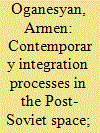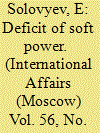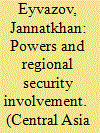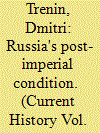| Srl | Item |
| 1 |
ID:
138489


|
|
|
|
|
| Summary/Abstract |
ESTEEMED COLLEAGUES, today we are meeting here in Yalta for the fifth time at an annual conference organized by the International Affairs journal with support from the Russian Foreign Ministry. At our meetings we discuss the concept of "Eurasianism" both as an idea and as the realization of this idea on the practical level. Every year, our discussion brings something new to the understanding and assessment of integration processes in the post-Soviet space regarding a broad spectrum of political, economic and humanitarian ties. Every year, the makeup of our participants renews and expands both numerically and geographically. Every year, we say good-bye only to meet here on the Crimean land again next fall. Today, this conference is especially important for us, as it is taking place in totally new geopolitical conditions. We have gathered again in Yalta, in Crimea, but this time on Russian land. I am looking forward to a lively and productive discussion. I would like to give the floor to Dmitry Alexeevich Polyansky.
|
|
|
|
|
|
|
|
|
|
|
|
|
|
|
|
| 2 |
ID:
100339


|
|
|
|
|
| Publication |
2010.
|
| Summary/Abstract |
ENERGY REMAINS one of the most important factors in the present-day world. Oil, gas, power engineering and the nuclear power industry constitute the core of Russia's modern economy, making it a serious player on the international arena, a true energy superpower. Oil, oil products and natural gas account for two-thirds of Russian exports. The oil and gas sector largely predetermines Russia's geopolitical positions and its role in ensuring the energy security of the globalizing world. Not surprisingly, the energy factor is regarded as one of the most important means of invigorating our cooperation with the CIS countries and even as an instrument of projecting Russia's power to different countries in the post-Soviet space.1 At the same time the energy sphere is a field of serious conflicts in the modern world. Suffice it to mention the wish of China, the U.S., and some EU countries to secure direct access to the oil and gas resources of Central Asia. Maintenance of its stature as an energy power and the expansion of its capabilities in the energy sphere are in fact closely linked to Russia's ability to strengthen its positions in the neighboring states, primarily in the Caucasus and Central Asia. However, achieving this only through traditional diplomatic methods of the past one and a half to two decades is a complex, almost unfeasible task.
|
|
|
|
|
|
|
|
|
|
|
|
|
|
|
|
| 3 |
ID:
163413


|
|
|
| 4 |
ID:
127612


|
|
|
|
|
| Publication |
2013.
|
| Summary/Abstract |
It is hardly possible to correctly and fully assess the functioning and development of a regional security system without presenting a complete account of the entire range of ties and relations among the actors involved and the degree of influence of all the powers concerned.
Based on a case study of the post-Soviet space, the author studies the involvement of powers in regional security systems; his analysis of the key parameters of this involvement makes it possible for him to identify and describe two types of involvement: full and partial.
|
|
|
|
|
|
|
|
|
|
|
|
|
|
|
|
| 5 |
ID:
179203


|
|
|
|
|
| Summary/Abstract |
The spread of dual citizenship in the post-Soviet space is becoming one of the most important tools for ensuring Russia’s hegemony in the region. However, this phenomenon is often overlooked in foreign policy analysis. The study of changes in Russian legislation shows that over the past three years Russia has created a legal framework that would accelerate the spread of dual citizenship in Ukraine and potentially in Belarus, Kazakhstan, and Moldova. So, Moscow gets powerful leverage, but its use has so far run into both internal constraints and concerns within the Russian government structures and the resistance of neighboring independent states. Thus, a new research field is taking shape at the intersection of several disciplines—political science, international studies, and sociology.
|
|
|
|
|
|
|
|
|
|
|
|
|
|
|
|
| 6 |
ID:
107235


|
|
|
|
|
| Publication |
2011.
|
| Summary/Abstract |
"Focused mainly on itself, and trying to avoid being dominated by any other countries, Moscow is striving to reconstitute itself as a great power."
|
|
|
|
|
|
|
|
|
|
|
|
|
|
|
|